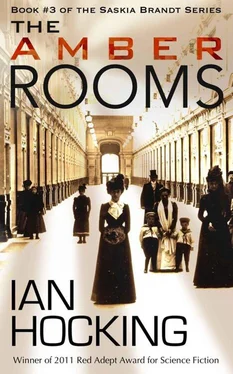The soldier was limping. He had a familiar blemish in his left eye.
Here was the dread; here was disaster.
‘Run,’ said Saskia, shoving Pasha.
The boy stumbled and looked at her, ready to smile.
She took a deep breath.
‘Yes, what is it?’ asked Mülheim. His eyebrows were raised. They hardly fell when Kamo withdrew his sabre and pushed its tip through his waistcoat. Mülheim tried to turn but the sabre held him. Kamo slid it clear. The small German man, who was so particular on points of architecture, slumped against the wall with his legs tucked beneath him, neat for death, coughing and looking at Kamo as though his behaviour was the height of rudeness. Then his expression faded.
Saskia said, ‘No, you don’t need to—’
Kamo lunged at her. She half turned and the sabre passed her shoulder. It scored a portrait. Their faces met. Kamo’s head was tipped back and his eyes were wide. Within this berserk trance he had tortured and raped; it was a personal storm in whose eye he could stay calm, while the world spun around him.
Before Kamo could draw back for another strike, Saskia let her muff fall to the floor. Even now, in this moment, she had a flush of awkwardness as her amputation was exposed. Pasha stepped in to block the blow but Saskia planted one foot on his hip and pushed him clear.
‘I said, “Run!”’ she screamed.
Kamo checked his attack. He twisted a full turn, keeping the sabre in motion, and brought the blade towards the boy at head height. She flashed her elbow into Pasha’s midriff. Winded, he collapsed. There was time for Saskia to drop to her knee. The sabre struck the window frame with a resonating clash of metal on brick.
Kamo reacted as though wounded by the sound. He glanced along the corridor.
Saskia gripped Pasha’s arm, then scissored her legs through those of Kamo. She used the boy as an anchor from which to twist her body. Kamo’s riding boots had a poor grip on the wooden floor. He slipped onto his hip and gasped. The sabre came down with him.
‘Run!’ she shouted once more.
Kamo stage-whispered, ‘Do you want to bring the entire household, woman?’
‘You idiot,’ she spat. ‘You’ve ruined everything.’
He stared at her for a moment. His confusion was genuine enough to shine through his madness. Then the clouds came down on his eyes. ‘It’s here, isn’t it? Our money. Take me to it!’
Kamo lashed at Pasha with the sabre. Saskia had time to put her heel into Kamo’s forehead and spoil the strike of the blade, but the flat caught Pasha above the ear. Pasha screamed and put a hand to the wound.
Saskia kicked Kamo in the head once more. She drew a little upon his madness. Dazed, he spilled beyond her range. She released Pasha, rolled towards Kamo, and brought her fist down on his biceps. His flexing hand released the sabre. She grabbed the handle, put it against her chest, and let the point rest on Kamo’s heart.
They were both breathing hard. She could smell his breath. It was pure Tiflis, its milk bars, and the spiced food. She smiled. This was just like old times. Kamo, despite himself, smiled back.
The sabre was heavy. Powerful. She could prick the heart of this man and he would unwind. Instead, she turned to the great window overlooking the palace square and drove the pommel into one of the lower panes. The sound of splintering glass echoed along the Picture Hall.
Kamo bared his teeth.
‘Pasha,’ she said, ‘jump.’
The boy, in his agony, looked up. ‘What?’ he gasped.
‘Lower yourself from the window. We’re only on the first floor. Keep your feet together when you land.’
When she turned back to Kamo, he was holding the end of the blade in his clapped hands, as though in prayer. Her one hand could not prevent him twisting the blade free. He caught the handle neatly—another Caucasian flourish—and jumped to a crouch. She dropped her shoulder as he lunged, but the tip passed through the fabric of her corset and skipped across the whalebone. She cried out and fell to her knees.
‘Go,’ she shouted, hoping that Pasha had relinquished his notions of honourable duty, that he was capable of saving himself. As Kamo withdrew the sword for a final blow, she saw, reflected in the cabinet opposite the window, the silhouette of Pasha slipping from the palace.
Sense at last.
She closed her eyes.
Arctic. Cool as.
~
Pasha lay on the forecourt of the Summer Palace. Is this real, or a future imagined by a boy, tumbling? The rain hit him, cold. His fingers were curled and his mouth had opened to its fullest extent. He could not move. This was a spell, surely; he had to let it pass. And when he heard the thump of boots landing near his head, he remembered the man who ran through Mr Mülheim with his sabre. Pasha tried to move but his body was fighting something else. If only he could reach for a piece of glass.
Pasha felt himself lifted. It reminded him of his father carrying him to his room. Pasha’s cheek rubbed against the tunic of the impostor. He felt a metal button. He knew that he was being kidnapped. He was a valuable prize. To rage against his immobility was to rage against his body, which was now his enemy.
Then, with a growl of effort from the impostor, he was thrown across the withers of a sturdy horse. The animal snorted. It was unhappy with the load. Then the three of them were galloping across the palace square. Pasha could do nothing but watch the rushing surface. His puffed face bounced against the flank. The horse’s smell was nauseating.
With a flourish, the impostor reined back on the horse. Another horse, belonging to a real guard officer, trotted by. Pasha was desperate to call out, but nothing more than a choking sound left his throat. The impostor did not stop to talk. In a strained voice, he called, ‘The boy is safe. Raise the alarm!’
They galloped on before the guard could reply. Pasha heard the hinge of the gate to Alexander Park and they were through. The deception had worked; Pasha spat bitterly.
The impostor wheeled the horse from the road and, in moments, they had lost themselves in the silence of the wood. Pasha saw nothing but the passing ground. There was a greater silence as the horse slowed to a stop. She was steaming with effort. Foam had caked Pasha’s cheek.
The impostor turned to Pasha and lifted his chin. Their eyes met. Pasha watched as Ms Tucholsky tipped her head forward and removed her cap. Her packed hair fell free. His last impression of her before unconsciousness smothered him was one of rage. She kicked the tree, but not with the control that had allowed her to flick the cigarette from his mouth. She fought with the buttons on her jacket. When it was open, she took a full breath and said an English word that Pasha had never heard before.
‘ Fuck .’
In the early evening, Saskia sat beneath an arch in the Beggars’ Market, an area in the Viasemskaya-Lavra quarter where the poor of St Petersburg gathered. She wore a boat cloak over her cape. There was ash on her cheeks. Parts of a trampled chicken, several days dead, were tucked into her boot-tops; the odour of putrefaction was sharp. Taken together, these precautions had deterred most of her tramp suitors, though one had suffered a fall and now regarded her tearfully from a newspaper nest not thirty feet away. Above the arches, it was raining, and the soot dripped blackly upon them all. She listened to the drops and parsed a structure there. The portal in the Amber Room would open once more, for the last time, at the midnight of six days hence.
Saskia remained still as a spider while the ladies from the night-shelter toured the poor, offering blankets and food vouchers. She watched them step around the vomit and broken glass. They ignored the unholy language and the fierce copulation. They only shook their heads. Saskia was impressed by them. She was less impressed by the St Petersburg police, who never thought to search for her among the filth.
Читать дальше












